Network Engineer Resume Examples

Jul 18, 2024
|
12 min read
Wired for Success: Upgrade your network engineer resume with these expert tips to help you connect with your next job opportunity.
Rated by 348 people
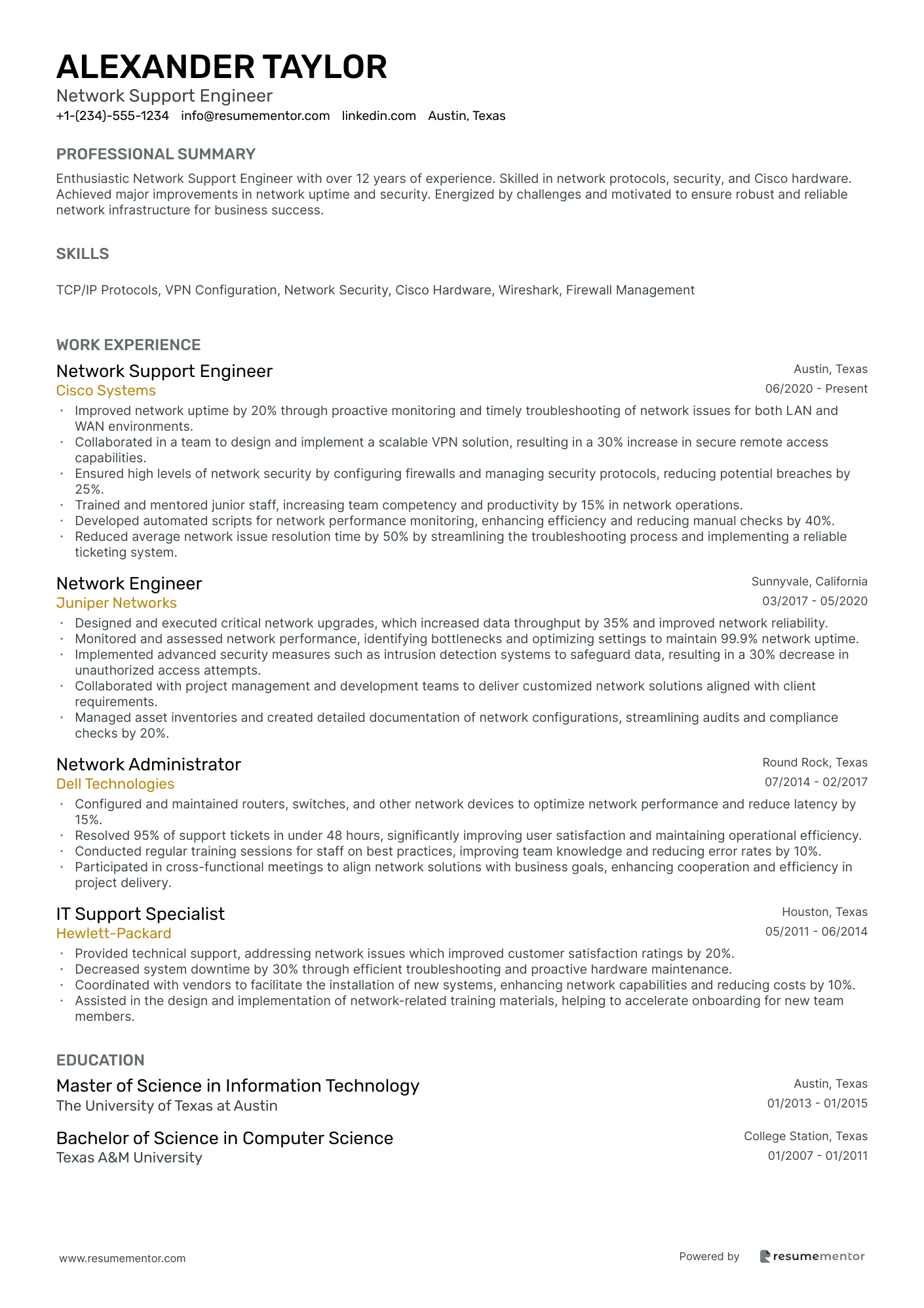
Network Support Engineer
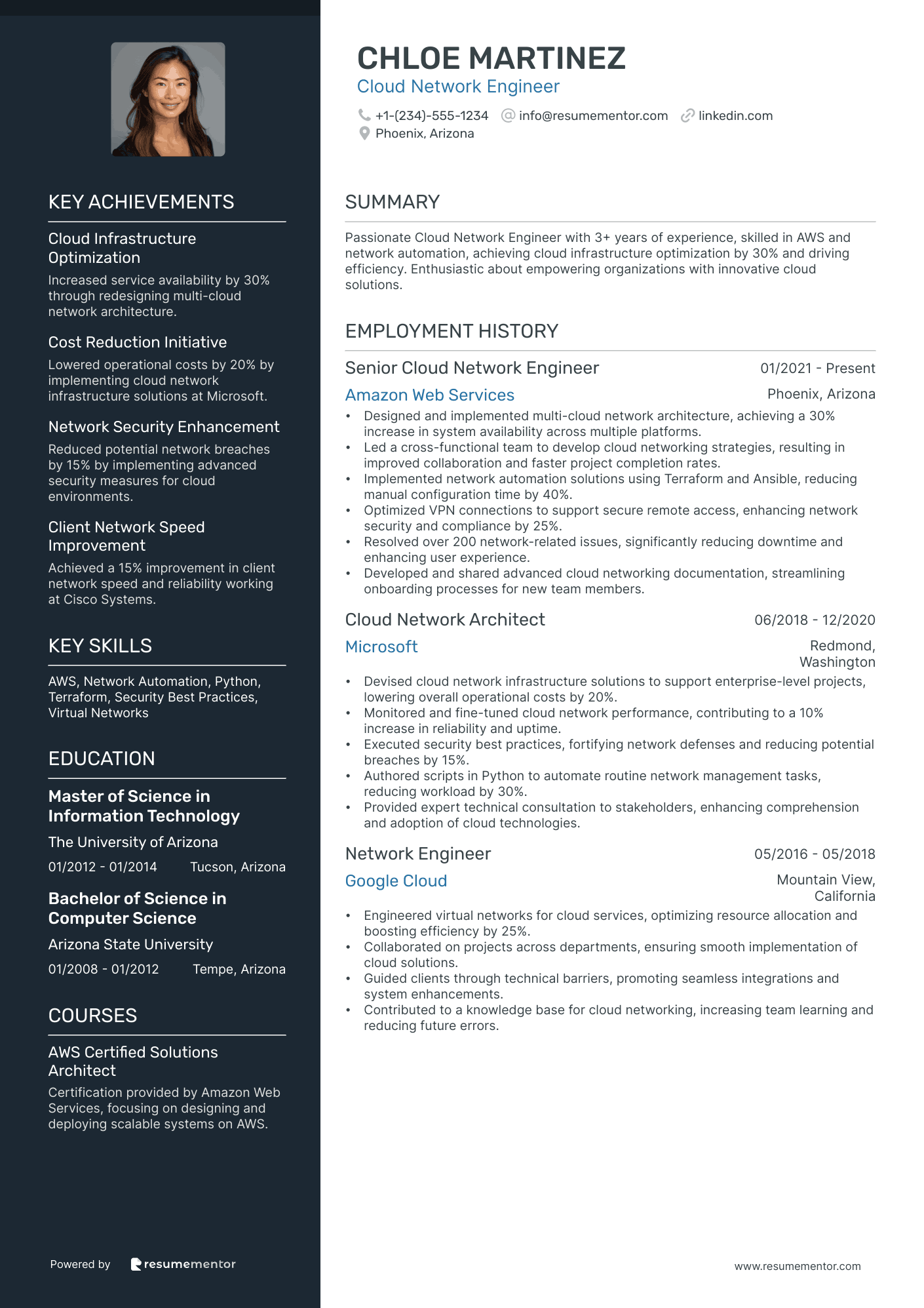
Cloud Network Engineer
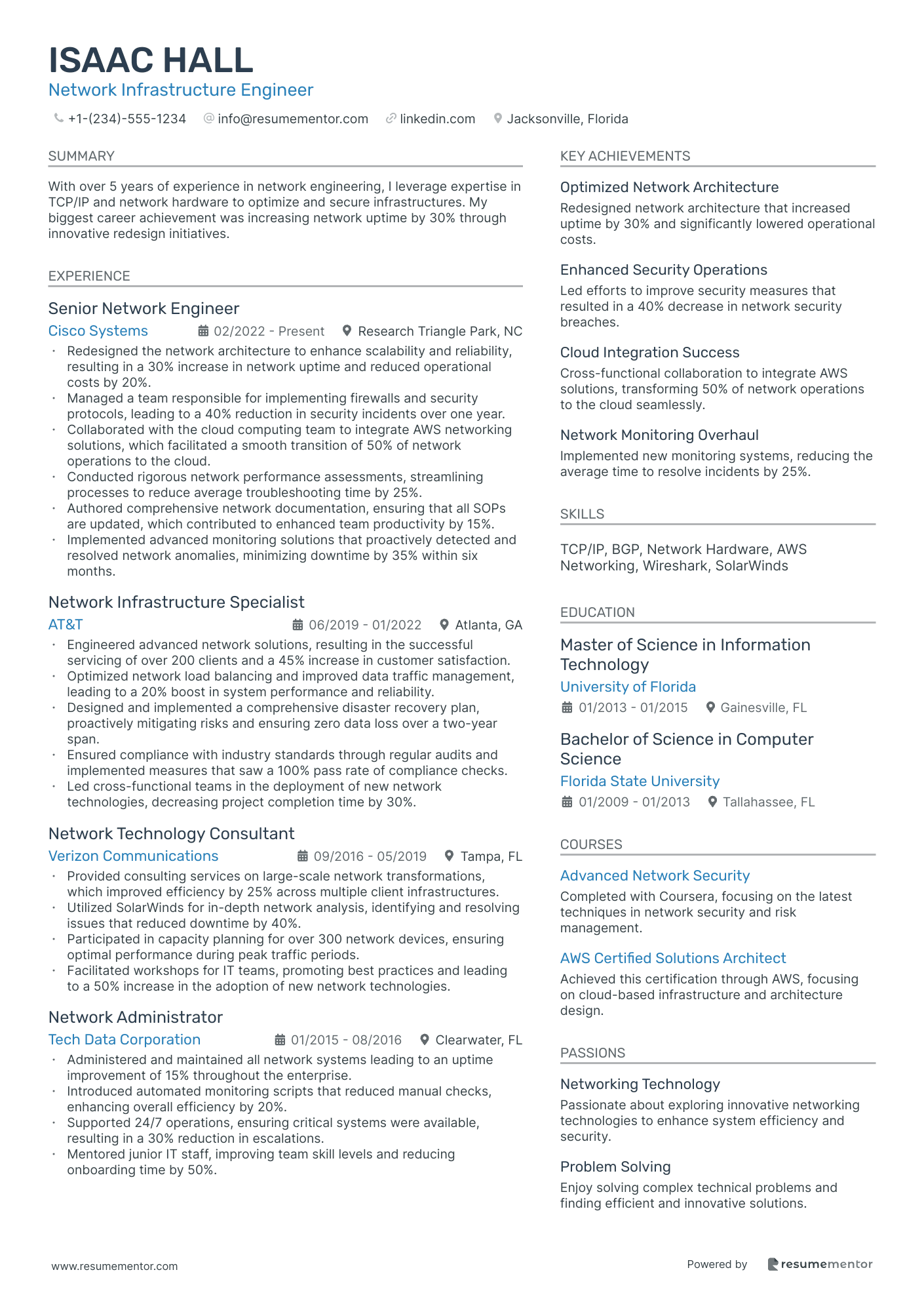
Network Infrastructure Engineer
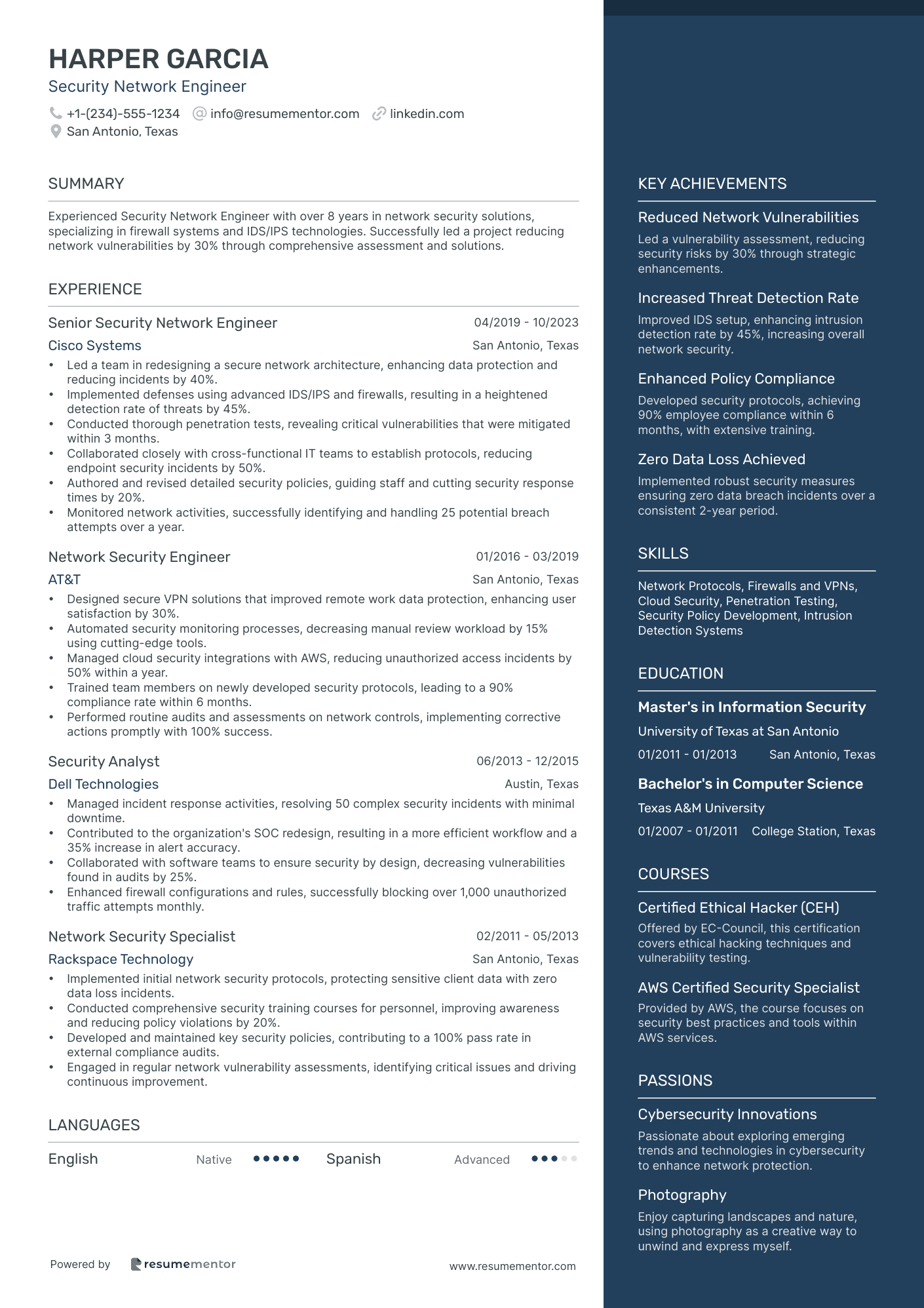
Security Network Engineer
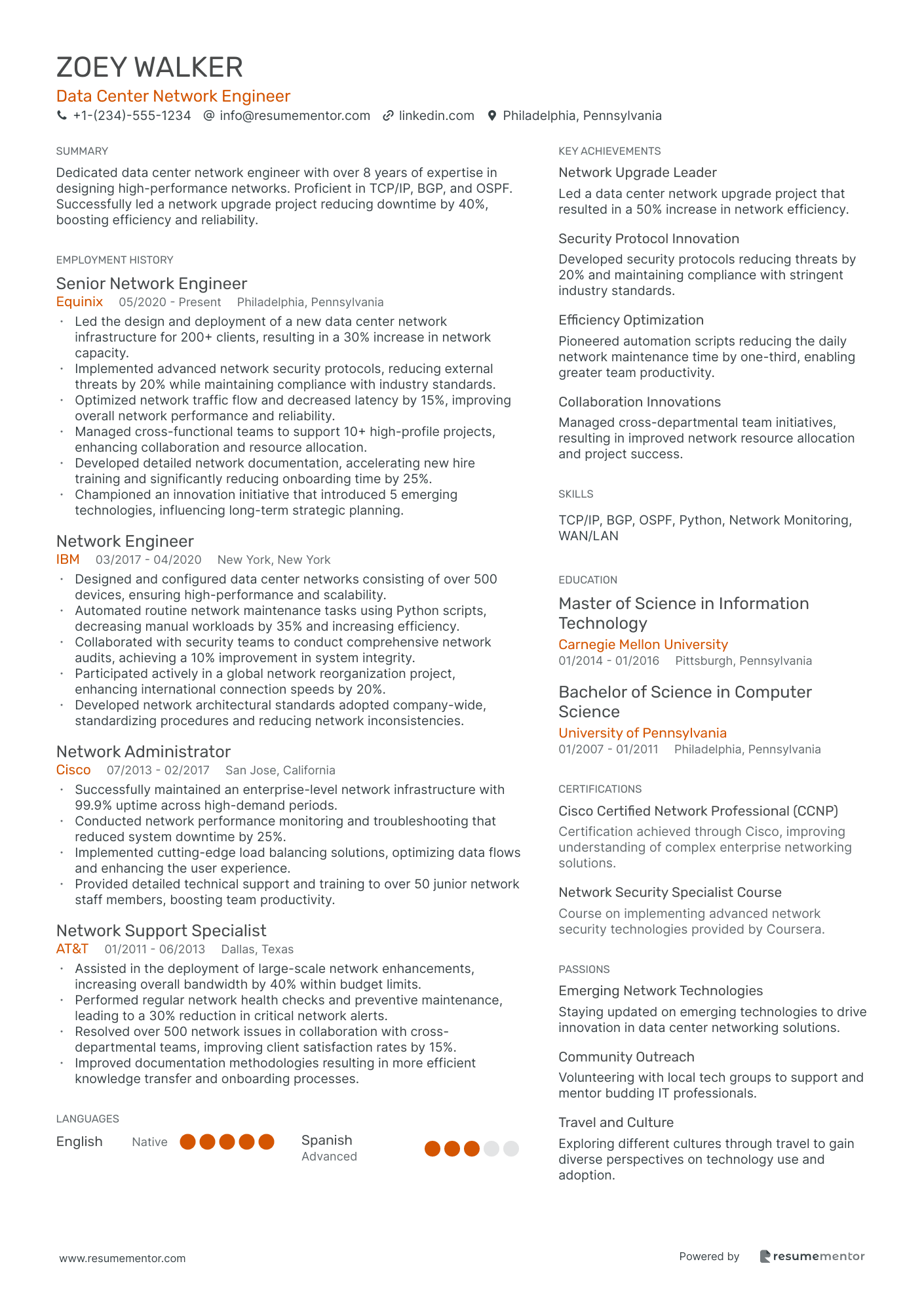
Data Center Network Engineer
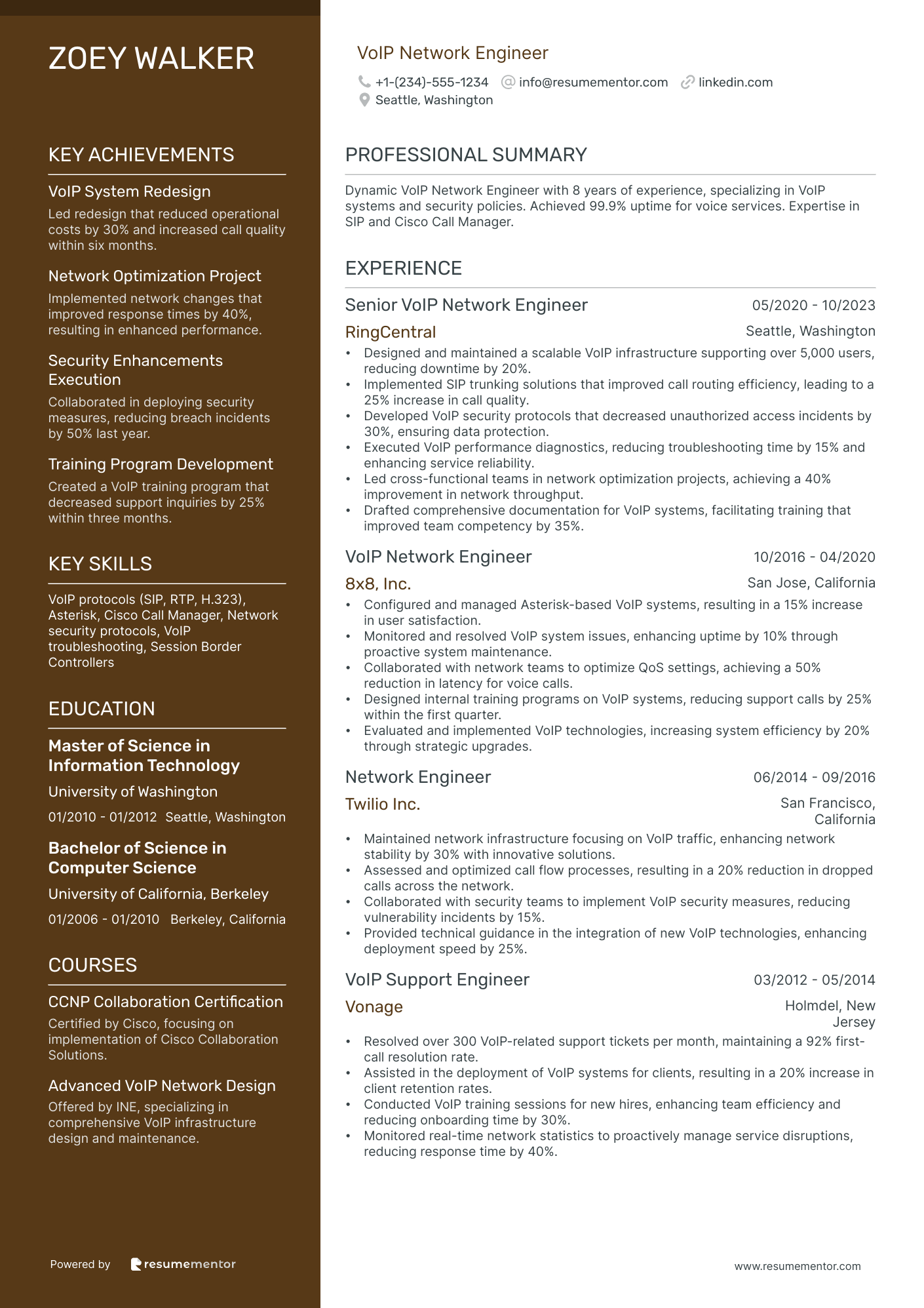
VoIP Network Engineer
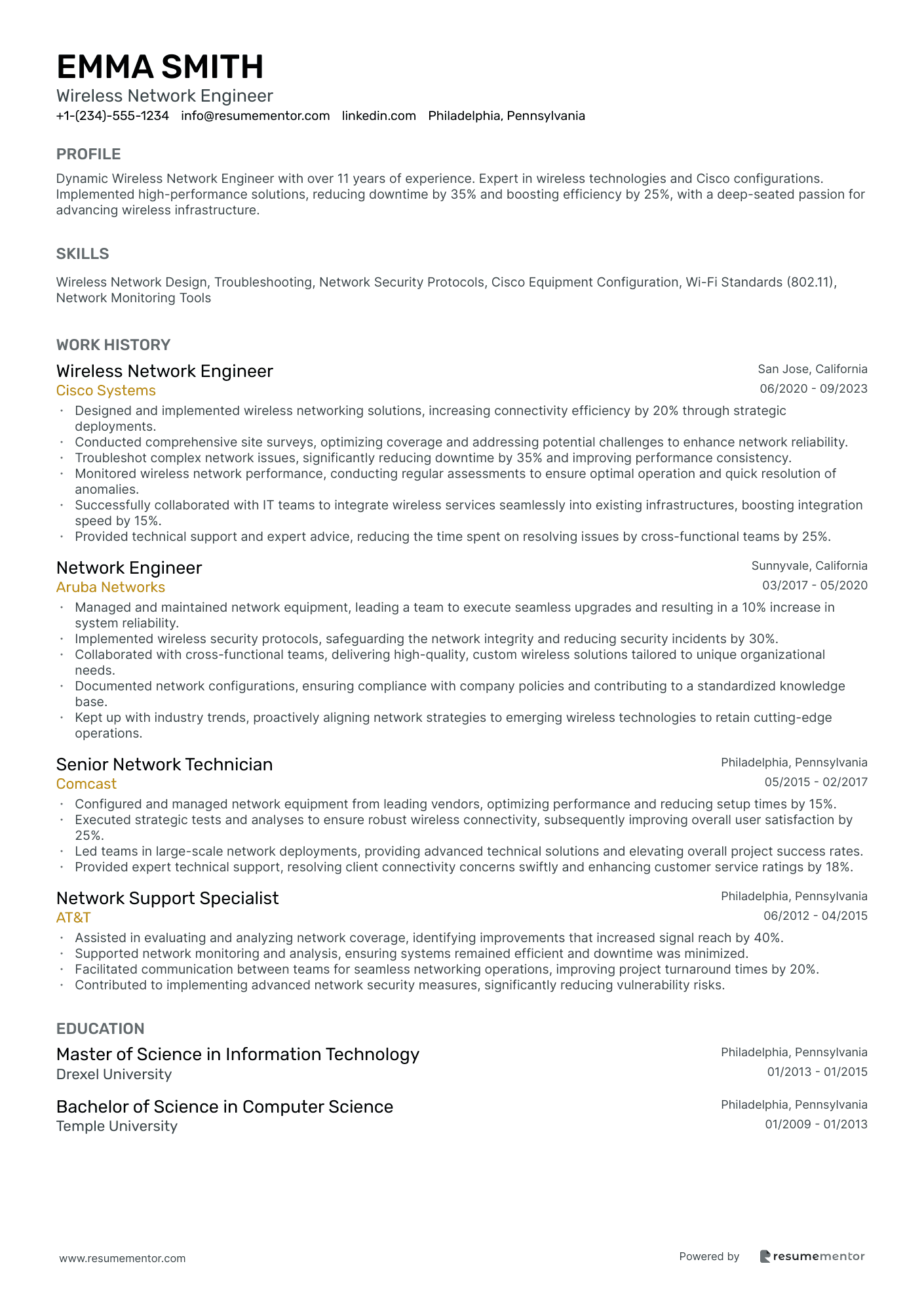
Wireless Network Engineer
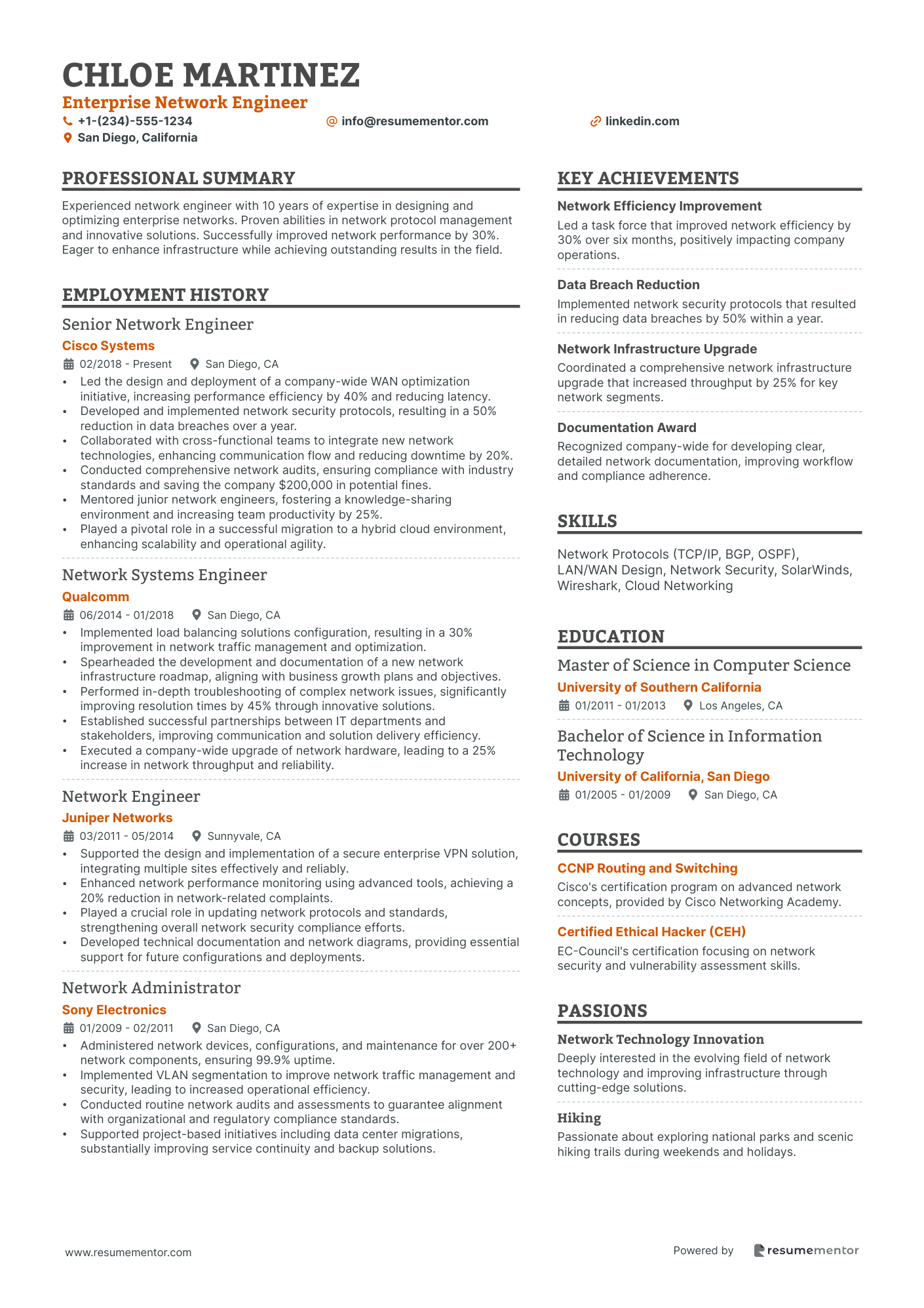
Enterprise Network Engineer
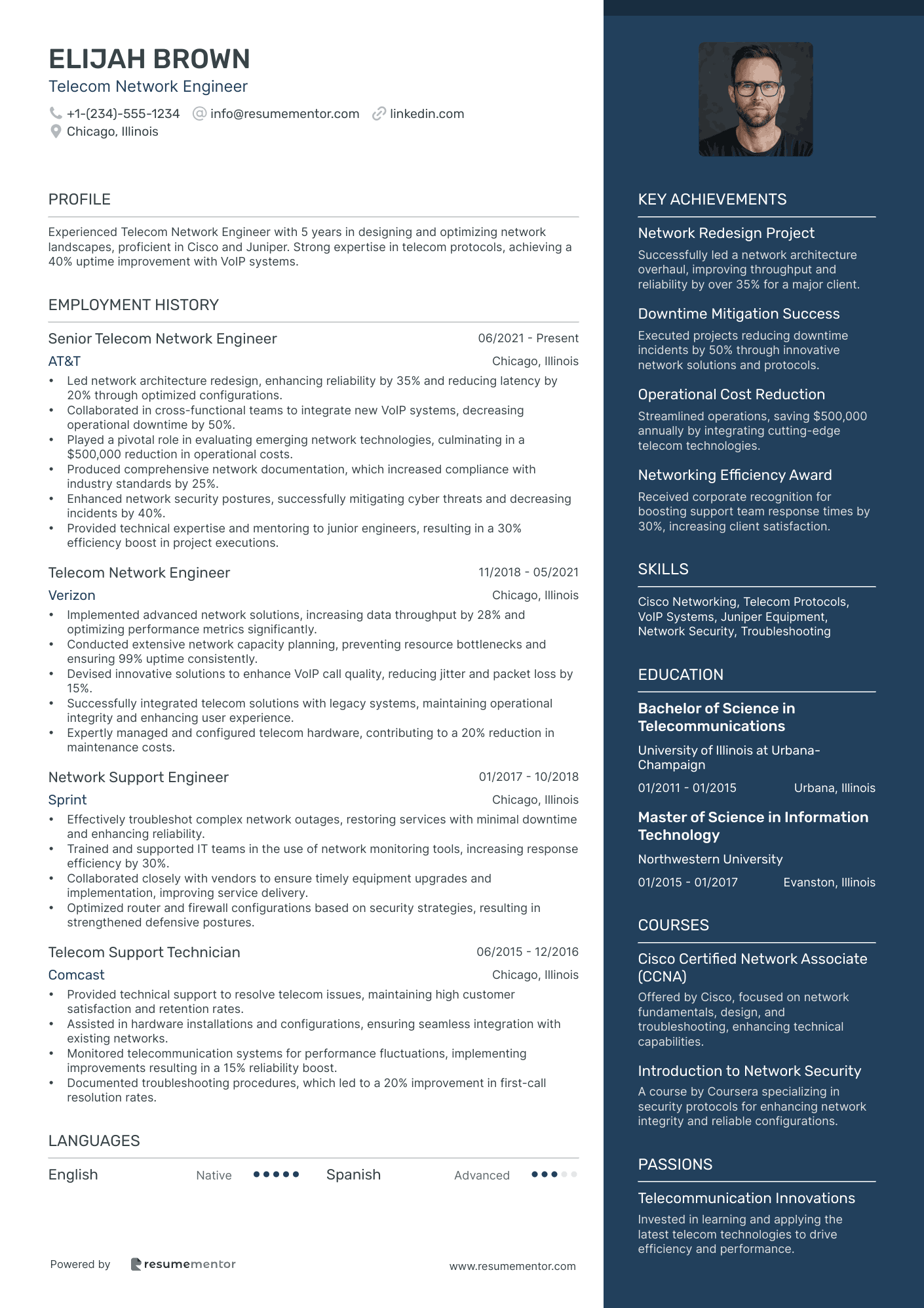
Telecom Network Engineer
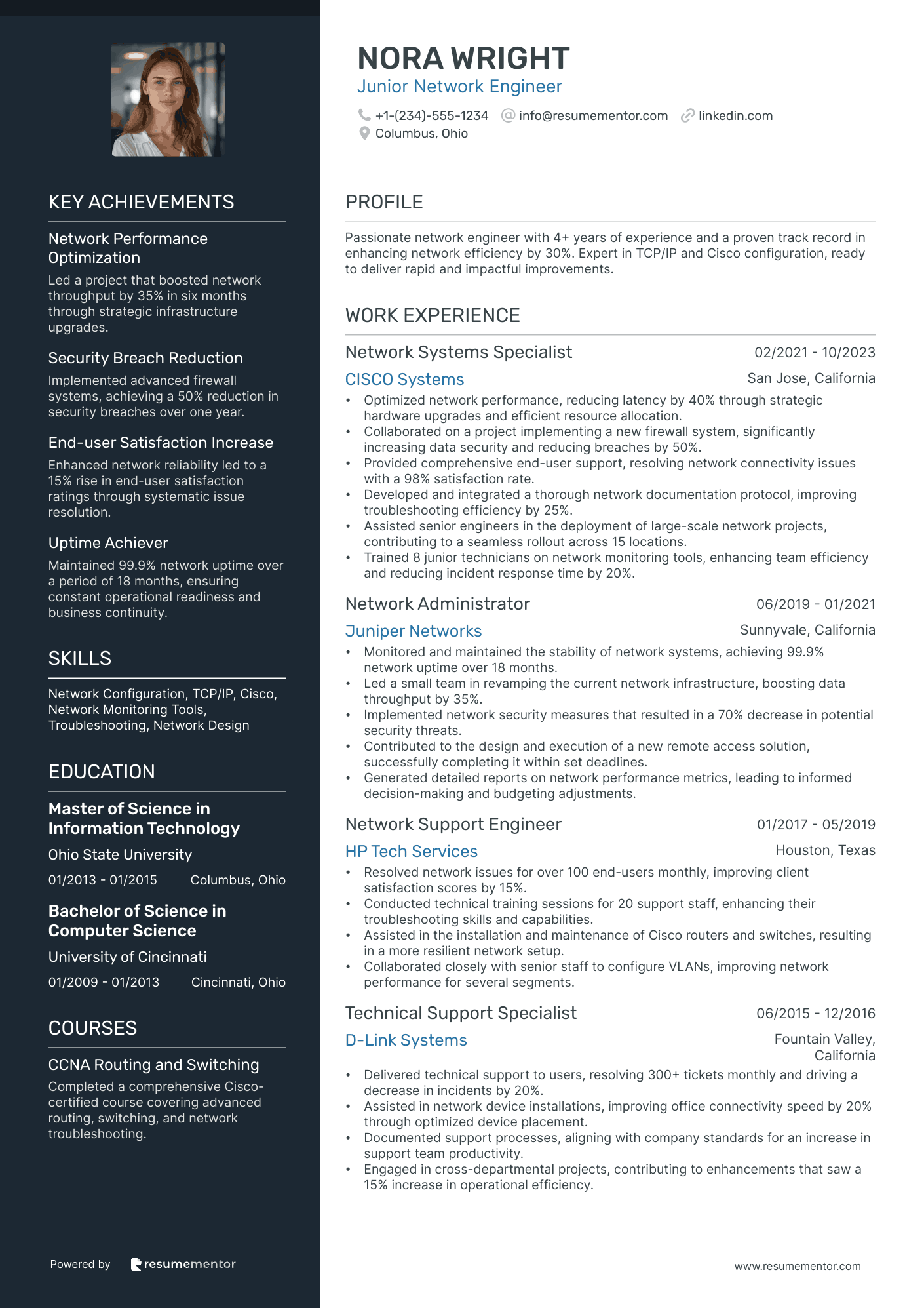
Junior Network Engineer

Network Support Engineer resume sample
- •Improved network uptime by 20% through proactive monitoring and timely troubleshooting of network issues for both LAN and WAN environments.
- •Collaborated in a team to design and implement a scalable VPN solution, resulting in a 30% increase in secure remote access capabilities.
- •Ensured high levels of network security by configuring firewalls and managing security protocols, reducing potential breaches by 25%.
- •Trained and mentored junior staff, increasing team competency and productivity by 15% in network operations.
- •Developed automated scripts for network performance monitoring, enhancing efficiency and reducing manual checks by 40%.
- •Reduced average network issue resolution time by 50% by streamlining the troubleshooting process and implementing a reliable ticketing system.
- •Designed and executed critical network upgrades, which increased data throughput by 35% and improved network reliability.
- •Monitored and assessed network performance, identifying bottlenecks and optimizing settings to maintain 99.9% network uptime.
- •Implemented advanced security measures such as intrusion detection systems to safeguard data, resulting in a 30% decrease in unauthorized access attempts.
- •Collaborated with project management and development teams to deliver customized network solutions aligned with client requirements.
- •Managed asset inventories and created detailed documentation of network configurations, streamlining audits and compliance checks by 20%.
- •Configured and maintained routers, switches, and other network devices to optimize network performance and reduce latency by 15%.
- •Resolved 95% of support tickets in under 48 hours, significantly improving user satisfaction and maintaining operational efficiency.
- •Conducted regular training sessions for staff on best practices, improving team knowledge and reducing error rates by 10%.
- •Participated in cross-functional meetings to align network solutions with business goals, enhancing cooperation and efficiency in project delivery.
- •Provided technical support, addressing network issues which improved customer satisfaction ratings by 20%.
- •Decreased system downtime by 30% through efficient troubleshooting and proactive hardware maintenance.
- •Coordinated with vendors to facilitate the installation of new systems, enhancing network capabilities and reducing costs by 10%.
- •Assisted in the design and implementation of network-related training materials, helping to accelerate onboarding for new team members.
Cloud Network Engineer resume sample
- •Designed and implemented multi-cloud network architecture, achieving a 30% increase in system availability across multiple platforms.
- •Led a cross-functional team to develop cloud networking strategies, resulting in improved collaboration and faster project completion rates.
- •Implemented network automation solutions using Terraform and Ansible, reducing manual configuration time by 40%.
- •Optimized VPN connections to support secure remote access, enhancing network security and compliance by 25%.
- •Resolved over 200 network-related issues, significantly reducing downtime and enhancing user experience.
- •Developed and shared advanced cloud networking documentation, streamlining onboarding processes for new team members.
- •Devised cloud network infrastructure solutions to support enterprise-level projects, lowering overall operational costs by 20%.
- •Monitored and fine-tuned cloud network performance, contributing to a 10% increase in reliability and uptime.
- •Executed security best practices, fortifying network defenses and reducing potential breaches by 15%.
- •Authored scripts in Python to automate routine network management tasks, reducing workload by 30%.
- •Provided expert technical consultation to stakeholders, enhancing comprehension and adoption of cloud technologies.
- •Engineered virtual networks for cloud services, optimizing resource allocation and boosting efficiency by 25%.
- •Collaborated on projects across departments, ensuring smooth implementation of cloud solutions.
- •Guided clients through technical barriers, promoting seamless integrations and system enhancements.
- •Contributed to a knowledge base for cloud networking, increasing team learning and reducing future errors.
- •Managed complex networking tasks, leading to a 15% improvement in client network speed and reliability.
- •Implemented monitoring solutions for network systems, aiding in the early detection and resolution of issues.
- •Enhanced security protocols to protect client data and ensure compliance with industry standards.
- •Conducted training sessions to educate peers on the latest networking technologies and trends.
Network Infrastructure Engineer resume sample
- •Redesigned the network architecture to enhance scalability and reliability, resulting in a 30% increase in network uptime and reduced operational costs by 20%.
- •Managed a team responsible for implementing firewalls and security protocols, leading to a 40% reduction in security incidents over one year.
- •Collaborated with the cloud computing team to integrate AWS networking solutions, which facilitated a smooth transition of 50% of network operations to the cloud.
- •Conducted rigorous network performance assessments, streamlining processes to reduce average troubleshooting time by 25%.
- •Authored comprehensive network documentation, ensuring that all SOPs are updated, which contributed to enhanced team productivity by 15%.
- •Implemented advanced monitoring solutions that proactively detected and resolved network anomalies, minimizing downtime by 35% within six months.
- •Engineered advanced network solutions, resulting in the successful servicing of over 200 clients and a 45% increase in customer satisfaction.
- •Optimized network load balancing and improved data traffic management, leading to a 20% boost in system performance and reliability.
- •Designed and implemented a comprehensive disaster recovery plan, proactively mitigating risks and ensuring zero data loss over a two-year span.
- •Ensured compliance with industry standards through regular audits and implemented measures that saw a 100% pass rate of compliance checks.
- •Led cross-functional teams in the deployment of new network technologies, decreasing project completion time by 30%.
- •Provided consulting services on large-scale network transformations, which improved efficiency by 25% across multiple client infrastructures.
- •Utilized SolarWinds for in-depth network analysis, identifying and resolving issues that reduced downtime by 40%.
- •Participated in capacity planning for over 300 network devices, ensuring optimal performance during peak traffic periods.
- •Facilitated workshops for IT teams, promoting best practices and leading to a 50% increase in the adoption of new network technologies.
- •Administered and maintained all network systems leading to an uptime improvement of 15% throughout the enterprise.
- •Introduced automated monitoring scripts that reduced manual checks, enhancing overall efficiency by 20%.
- •Supported 24/7 operations, ensuring critical systems were available, resulting in a 30% reduction in escalations.
- •Mentored junior IT staff, improving team skill levels and reducing onboarding time by 50%.
Security Network Engineer resume sample
- •Led a team in redesigning a secure network architecture, enhancing data protection and reducing incidents by 40%.
- •Implemented defenses using advanced IDS/IPS and firewalls, resulting in a heightened detection rate of threats by 45%.
- •Conducted thorough penetration tests, revealing critical vulnerabilities that were mitigated within 3 months.
- •Collaborated closely with cross-functional IT teams to establish protocols, reducing endpoint security incidents by 50%.
- •Authored and revised detailed security policies, guiding staff and cutting security response times by 20%.
- •Monitored network activities, successfully identifying and handling 25 potential breach attempts over a year.
- •Designed secure VPN solutions that improved remote work data protection, enhancing user satisfaction by 30%.
- •Automated security monitoring processes, decreasing manual review workload by 15% using cutting-edge tools.
- •Managed cloud security integrations with AWS, reducing unauthorized access incidents by 50% within a year.
- •Trained team members on newly developed security protocols, leading to a 90% compliance rate within 6 months.
- •Performed routine audits and assessments on network controls, implementing corrective actions promptly with 100% success.
- •Managed incident response activities, resolving 50 complex security incidents with minimal downtime.
- •Contributed to the organization's SOC redesign, resulting in a more efficient workflow and a 35% increase in alert accuracy.
- •Collaborated with software teams to ensure security by design, decreasing vulnerabilities found in audits by 25%.
- •Enhanced firewall configurations and rules, successfully blocking over 1,000 unauthorized traffic attempts monthly.
- •Implemented initial network security protocols, protecting sensitive client data with zero data loss incidents.
- •Conducted comprehensive security training courses for personnel, improving awareness and reducing policy violations by 20%.
- •Developed and maintained key security policies, contributing to a 100% pass rate in external compliance audits.
- •Engaged in regular network vulnerability assessments, identifying critical issues and driving continuous improvement.
Data Center Network Engineer resume sample
- •Led the design and deployment of a new data center network infrastructure for 200+ clients, resulting in a 30% increase in network capacity.
- •Implemented advanced network security protocols, reducing external threats by 20% while maintaining compliance with industry standards.
- •Optimized network traffic flow and decreased latency by 15%, improving overall network performance and reliability.
- •Managed cross-functional teams to support 10+ high-profile projects, enhancing collaboration and resource allocation.
- •Developed detailed network documentation, accelerating new hire training and significantly reducing onboarding time by 25%.
- •Championed an innovation initiative that introduced 5 emerging technologies, influencing long-term strategic planning.
- •Designed and configured data center networks consisting of over 500 devices, ensuring high-performance and scalability.
- •Automated routine network maintenance tasks using Python scripts, decreasing manual workloads by 35% and increasing efficiency.
- •Collaborated with security teams to conduct comprehensive network audits, achieving a 10% improvement in system integrity.
- •Participated actively in a global network reorganization project, enhancing international connection speeds by 20%.
- •Developed network architectural standards adopted company-wide, standardizing procedures and reducing network inconsistencies.
- •Successfully maintained an enterprise-level network infrastructure with 99.9% uptime across high-demand periods.
- •Conducted network performance monitoring and troubleshooting that reduced system downtime by 25%.
- •Implemented cutting-edge load balancing solutions, optimizing data flows and enhancing the user experience.
- •Provided detailed technical support and training to over 50 junior network staff members, boosting team productivity.
- •Assisted in the deployment of large-scale network enhancements, increasing overall bandwidth by 40% within budget limits.
- •Performed regular network health checks and preventive maintenance, leading to a 30% reduction in critical network alerts.
- •Resolved over 500 network issues in collaboration with cross-departmental teams, improving client satisfaction rates by 15%.
- •Improved documentation methodologies resulting in more efficient knowledge transfer and onboarding processes.
VoIP Network Engineer resume sample
- •Designed and maintained a scalable VoIP infrastructure supporting over 5,000 users, reducing downtime by 20%.
- •Implemented SIP trunking solutions that improved call routing efficiency, leading to a 25% increase in call quality.
- •Developed VoIP security protocols that decreased unauthorized access incidents by 30%, ensuring data protection.
- •Executed VoIP performance diagnostics, reducing troubleshooting time by 15% and enhancing service reliability.
- •Led cross-functional teams in network optimization projects, achieving a 40% improvement in network throughput.
- •Drafted comprehensive documentation for VoIP systems, facilitating training that improved team competency by 35%.
- •Configured and managed Asterisk-based VoIP systems, resulting in a 15% increase in user satisfaction.
- •Monitored and resolved VoIP system issues, enhancing uptime by 10% through proactive system maintenance.
- •Collaborated with network teams to optimize QoS settings, achieving a 50% reduction in latency for voice calls.
- •Designed internal training programs on VoIP systems, reducing support calls by 25% within the first quarter.
- •Evaluated and implemented VoIP technologies, increasing system efficiency by 20% through strategic upgrades.
- •Maintained network infrastructure focusing on VoIP traffic, enhancing network stability by 30% with innovative solutions.
- •Assessed and optimized call flow processes, resulting in a 20% reduction in dropped calls across the network.
- •Collaborated with security teams to implement VoIP security measures, reducing vulnerability incidents by 15%.
- •Provided technical guidance in the integration of new VoIP technologies, enhancing deployment speed by 25%.
- •Resolved over 300 VoIP-related support tickets per month, maintaining a 92% first-call resolution rate.
- •Assisted in the deployment of VoIP systems for clients, resulting in a 20% increase in client retention rates.
- •Conducted VoIP training sessions for new hires, enhancing team efficiency and reducing onboarding time by 30%.
- •Monitored real-time network statistics to proactively manage service disruptions, reducing response time by 40%.
Wireless Network Engineer resume sample
- •Designed and implemented wireless networking solutions, increasing connectivity efficiency by 20% through strategic deployments.
- •Conducted comprehensive site surveys, optimizing coverage and addressing potential challenges to enhance network reliability.
- •Troubleshot complex network issues, significantly reducing downtime by 35% and improving performance consistency.
- •Monitored wireless network performance, conducting regular assessments to ensure optimal operation and quick resolution of anomalies.
- •Successfully collaborated with IT teams to integrate wireless services seamlessly into existing infrastructures, boosting integration speed by 15%.
- •Provided technical support and expert advice, reducing the time spent on resolving issues by cross-functional teams by 25%.
- •Managed and maintained network equipment, leading a team to execute seamless upgrades and resulting in a 10% increase in system reliability.
- •Implemented wireless security protocols, safeguarding the network integrity and reducing security incidents by 30%.
- •Collaborated with cross-functional teams, delivering high-quality, custom wireless solutions tailored to unique organizational needs.
- •Documented network configurations, ensuring compliance with company policies and contributing to a standardized knowledge base.
- •Kept up with industry trends, proactively aligning network strategies to emerging wireless technologies to retain cutting-edge operations.
- •Configured and managed network equipment from leading vendors, optimizing performance and reducing setup times by 15%.
- •Executed strategic tests and analyses to ensure robust wireless connectivity, subsequently improving overall user satisfaction by 25%.
- •Led teams in large-scale network deployments, providing advanced technical solutions and elevating overall project success rates.
- •Provided expert technical support, resolving client connectivity concerns swiftly and enhancing customer service ratings by 18%.
- •Assisted in evaluating and analyzing network coverage, identifying improvements that increased signal reach by 40%.
- •Supported network monitoring and analysis, ensuring systems remained efficient and downtime was minimized.
- •Facilitated communication between teams for seamless networking operations, improving project turnaround times by 20%.
- •Contributed to implementing advanced network security measures, significantly reducing vulnerability risks.
Enterprise Network Engineer resume sample
- •Led the design and deployment of a company-wide WAN optimization initiative, increasing performance efficiency by 40% and reducing latency.
- •Developed and implemented network security protocols, resulting in a 50% reduction in data breaches over a year.
- •Collaborated with cross-functional teams to integrate new network technologies, enhancing communication flow and reducing downtime by 20%.
- •Conducted comprehensive network audits, ensuring compliance with industry standards and saving the company $200,000 in potential fines.
- •Mentored junior network engineers, fostering a knowledge-sharing environment and increasing team productivity by 25%.
- •Played a pivotal role in a successful migration to a hybrid cloud environment, enhancing scalability and operational agility.
- •Implemented load balancing solutions configuration, resulting in a 30% improvement in network traffic management and optimization.
- •Spearheaded the development and documentation of a new network infrastructure roadmap, aligning with business growth plans and objectives.
- •Performed in-depth troubleshooting of complex network issues, significantly improving resolution times by 45% through innovative solutions.
- •Established successful partnerships between IT departments and stakeholders, improving communication and solution delivery efficiency.
- •Executed a company-wide upgrade of network hardware, leading to a 25% increase in network throughput and reliability.
- •Supported the design and implementation of a secure enterprise VPN solution, integrating multiple sites effectively and reliably.
- •Enhanced network performance monitoring using advanced tools, achieving a 20% reduction in network-related complaints.
- •Played a crucial role in updating network protocols and standards, strengthening overall network security compliance efforts.
- •Developed technical documentation and network diagrams, providing essential support for future configurations and deployments.
- •Administered network devices, configurations, and maintenance for over 200+ network components, ensuring 99.9% uptime.
- •Implemented VLAN segmentation to improve network traffic management and security, leading to increased operational efficiency.
- •Conducted routine network audits and assessments to guarantee alignment with organizational and regulatory compliance standards.
- •Supported project-based initiatives including data center migrations, substantially improving service continuity and backup solutions.
Telecom Network Engineer resume sample
- •Led network architecture redesign, enhancing reliability by 35% and reducing latency by 20% through optimized configurations.
- •Collaborated in cross-functional teams to integrate new VoIP systems, decreasing operational downtime by 50%.
- •Played a pivotal role in evaluating emerging network technologies, culminating in a $500,000 reduction in operational costs.
- •Produced comprehensive network documentation, which increased compliance with industry standards by 25%.
- •Enhanced network security postures, successfully mitigating cyber threats and decreasing incidents by 40%.
- •Provided technical expertise and mentoring to junior engineers, resulting in a 30% efficiency boost in project executions.
- •Implemented advanced network solutions, increasing data throughput by 28% and optimizing performance metrics significantly.
- •Conducted extensive network capacity planning, preventing resource bottlenecks and ensuring 99% uptime consistently.
- •Devised innovative solutions to enhance VoIP call quality, reducing jitter and packet loss by 15%.
- •Successfully integrated telecom solutions with legacy systems, maintaining operational integrity and enhancing user experience.
- •Expertly managed and configured telecom hardware, contributing to a 20% reduction in maintenance costs.
- •Effectively troubleshot complex network outages, restoring services with minimal downtime and enhancing reliability.
- •Trained and supported IT teams in the use of network monitoring tools, increasing response efficiency by 30%.
- •Collaborated closely with vendors to ensure timely equipment upgrades and implementation, improving service delivery.
- •Optimized router and firewall configurations based on security strategies, resulting in strengthened defensive postures.
- •Provided technical support to resolve telecom issues, maintaining high customer satisfaction and retention rates.
- •Assisted in hardware installations and configurations, ensuring seamless integration with existing networks.
- •Monitored telecommunication systems for performance fluctuations, implementing improvements resulting in a 15% reliability boost.
- •Documented troubleshooting procedures, which led to a 20% improvement in first-call resolution rates.
Junior Network Engineer resume sample
- •Optimized network performance, reducing latency by 40% through strategic hardware upgrades and efficient resource allocation.
- •Collaborated on a project implementing a new firewall system, significantly increasing data security and reducing breaches by 50%.
- •Provided comprehensive end-user support, resolving network connectivity issues with a 98% satisfaction rate.
- •Developed and integrated a thorough network documentation protocol, improving troubleshooting efficiency by 25%.
- •Assisted senior engineers in the deployment of large-scale network projects, contributing to a seamless rollout across 15 locations.
- •Trained 8 junior technicians on network monitoring tools, enhancing team efficiency and reducing incident response time by 20%.
- •Monitored and maintained the stability of network systems, achieving 99.9% network uptime over 18 months.
- •Led a small team in revamping the current network infrastructure, boosting data throughput by 35%.
- •Implemented network security measures that resulted in a 70% decrease in potential security threats.
- •Contributed to the design and execution of a new remote access solution, successfully completing it within set deadlines.
- •Generated detailed reports on network performance metrics, leading to informed decision-making and budgeting adjustments.
- •Resolved network issues for over 100 end-users monthly, improving client satisfaction scores by 15%.
- •Conducted technical training sessions for 20 support staff, enhancing their troubleshooting skills and capabilities.
- •Assisted in the installation and maintenance of Cisco routers and switches, resulting in a more resilient network setup.
- •Collaborated closely with senior staff to configure VLANs, improving network performance for several segments.
- •Delivered technical support to users, resolving 300+ tickets monthly and driving a decrease in incidents by 20%.
- •Assisted in network device installations, improving office connectivity speed by 20% through optimized device placement.
- •Documented support processes, aligning with company standards for an increase in support team productivity.
- •Engaged in cross-departmental projects, contributing to enhancements that saw a 15% increase in operational efficiency.
As a network engineer, you're like the invisible architect, designing the digital bridges that keep businesses running smoothly. Your expertise in complex systems solves problems others might not even notice, yet translating this into a resume can feel like explaining a blueprint to someone unfamiliar with your field.
To make a strong connection with potential employers, your resume must effectively communicate your technical expertise. Highlighting your unique skills, experiences, and contributions helps your potential employer understand your value. Given the complexity of your work, a structured, easy-to-read resume is crucial.
Organizing your information with a well-crafted resume template can significantly enhance clarity and presentation. Templates provide a structured platform that allows your achievements to emerge clearly. Check out these resume templates to start building a resume that accurately reflects your skills.
By arranging your thoughts and experiences cohesively, you enable hiring managers to see quickly how you can add value to their team. This guide will help you focus on what truly matters, ensuring your resume becomes a true reflection of your network engineering abilities and career goals.
Key Takeaways
- Your network engineer resume should effectively communicate your technical expertise and clearly highlight unique skills, work experiences, and contributions to show potential employers your value.
- The reverse-chronological resume format is ideal for showcasing career growth, emphasizing clarity and professionalism, and saving your resume as a PDF ensures consistent formatting across devices.
- Quantifiable experience sections should illustrate your impact using accomplishments, responsibilities, and relevant skills, with action verbs to emphasize your results-driven approach.
- Your skills section should stand out prominently, highlighting both hard skills like network configuration and firewall management, alongside soft skills such as communication and problem-solving.
- Include a certificates section that lists relevant professional certifications from recognized bodies, adding credibility to your qualifications as a network engineer.
What to focus on when writing your network engineer resume
Your network engineer resume should clearly convey your expertise in network management and optimization. Start with your contact information—it should be prominently displayed so recruiters can easily reach out. This includes your full name, phone number, email address, and LinkedIn profile.
How to structure your network engineer resume
- Professional Summary — A brief, focused overview of your experience and skills. This section should encapsulate your years of experience in network engineering and the specific network systems you've worked on, setting the stage for the details that follow.
- Skills — Highlight abilities like network troubleshooting, protocol switching, and network security. Mention your familiarity with key tools like Cisco and Juniper to ensure a recruiter sees the full scope of your technical skills.
- Work Experience — Detail your previous job roles, the companies you've worked for, and your employment duration. Connect your responsibilities to your skills, showcasing achievements in network management and system optimization that demonstrate your problem-solving abilities.
- Education — List your degree and institution, as well as any relevant certifications such as CCNA or CCNP. This provides evidence of your formal training and preparedness for the role.
- Technical Certifications — These should highlight specialized knowledge, like CISSP or CCIE, that distinguishes you from other candidates.
Now that we've laid out the foundation of your resume, let's cover the format—and how to detail each section for maximum impact.
Which resume format to choose
Crafting a network engineer resume requires selecting a format that effectively highlights your skills and experience. The reverse-chronological format is ideal because it clearly showcases your career growth, allowing employers to easily see how your expertise has developed over time. In a technical field like network engineering, it’s important to maintain clarity and professionalism. Choosing modern fonts such as Lato, Montserrat, and Raleway can give your resume a polished, contemporary feel while ensuring readability. Opting to save your resume as a PDF is crucial; it locks in your formatting, guaranteeing that it looks the same on any device or platform, which is particularly important when applying online. To keep your resume looking neat and organized, maintain margins of about one inch on each side. This not only structures your content nicely but also makes it easy for hiring managers to read. By paying attention to these details, you create a resume that effectively communicates your qualifications in the competitive field of network engineering.
How to write a quantifiable resume experience section
Your network engineer expertise is a crucial part of your resume experience section. By focusing on accomplishments, responsibilities, and relevant skills, you can clearly demonstrate your impact and align your experience with the employer's needs. Begin with your most recent job to illustrate career growth and ensure you're covering 10-15 years or your last three significant roles. Highlight positions that reflect both technical competence and leadership, depending on your career path. Tailoring your resume is essential; align your experiences with specific skills and requirements from the job ad. Use action verbs like "optimized," "implemented," "designed," and "enhanced" to underline your results-driven approach and initiative.
- •Cut network downtime by 30% by upgrading core switches and adding redundancy protocols.
- •Boosted network performance by 25% by redesigning the system for high availability and adding advanced routing.
- •Led a team on a global WAN optimization project, enhancing data transfer speeds by 40%.
- •Built a strong security framework, cutting cybersecurity incidents by 50% with regular audits and updates.
This section excels by weaving measurable achievements into a cohesive narrative that highlights your impact. Each bullet speaks to your ability to drive results, using quantifiable data to demonstrate success. Strong action verbs reflect your capability to address and solve challenges effectively, showcasing your initiative. This approach maintains consistency with senior-level expectations, and by tailoring your experience to highlight performance boosts and reduced downtimes, you underline both your technical proficiency and the significant value you bring to potential employers.
Efficiency-Focused resume experience section
An efficiency-focused network engineer resume experience section should clearly demonstrate your ability to enhance systems, boost productivity, and reduce costs. Start each entry with the timeframe and a descriptive title, using bullet points that highlight your skills in problem-solving and process optimization. By using strong action verbs like "streamlined," "enhanced," or "accelerated," you can effectively convey your impact on achieving greater speed and efficiency. Each bullet point should then provide quantifiable evidence of cost-saving initiatives or performance enhancements you've achieved.
When detailing your experience, emphasize the situations you faced, the tasks you managed, and the specific actions you took, along with the successful outcomes. Tailor these entries to highlight achievements related to efficiency, such as a complex network project where you reduced latency or ensured smooth system operation during peak times. Demonstrating your expertise in tools or methodologies that drive efficiency will make your resume stand out.
Senior Network Engineer
Tech Innovations Ltd.
June 2019 - August 2023
- Reduced network latency by 30% through systematic reconfiguration, leading to faster data transfer.
- Implemented automated monitoring solutions that cut system downtime by 15%, ensuring high uptime during busy periods.
- Optimized server performance, resulting in a 25% increase in data processing speed company-wide.
- Introduced cost-effective network infrastructure changes, saving $50,000 per year in operational costs.
Training and Development Focused resume experience section
A training-focused network engineer resume experience section should clearly highlight how your previous roles equipped you to enhance team skills and knowledge. Start by showcasing experiences where you played a key role in creating and implementing training programs that led to tangible improvements. For instance, detail achievements such as improving onboarding processes or elevating team compliance with industry standards to demonstrate your impact. Providing data and metrics helps potential employers visualize the results of your efforts.
Incorporate information on relevant certifications or software proficiencies that stemmed from your training initiatives to further illustrate your expertise. Use clear and active language to create a cohesive and engaging narrative. Each bullet point should seamlessly connect to the theme of facilitating education and skill development, collectively portraying you as both a skilled network engineer and an innovative educator dedicated to fostering team success.
Senior Network Engineer
Tech Innovators Inc.
June 2020 - Present
- Developed a comprehensive training program for new network engineers, reducing onboarding time by 30%.
- Led workshop sessions on network security protocols, increasing team compliance with industry standards by 40%.
- Initiated a mentorship program that paired senior engineers with junior staff, boosting job satisfaction scores by 25%.
- Created and presented monthly tech forums that improved cross-departmental technology skills.
Industry-Specific Focus resume experience section
A network engineer-focused resume experience section should clearly highlight your technical skills and achievements in a cohesive manner. Start with experiences that showcase your ability to design, implement, and manage complex networks, helping potential employers see your problem-solving skills and the impact you've made. Share your specific role in projects and the positive outcomes, using bullet points to outline accomplishments like increased network efficiency and reduced downtime. This direct approach guides hiring managers to understand how your strengths can benefit their team.
In each bullet point, use action verbs to convey energy and competency, while avoiding technical jargon and choosing language that's easy for anyone to grasp. Provide context with job titles, workplace names, and employment dates, allowing your detailed experiences to paint a picture of your capabilities. By tailoring this section for each application, you ensure your specific skills and achievements resonate with the role you're aiming for. This tailored approach helps potential employers visualize you as a valuable addition to their network team.
Senior Network Engineer
Tech Solutions Inc.
June 2018 - Present
- Led a team of engineers to design and implement a corporate LAN/WAN infrastructure, boosting system efficiency by 30%.
- Improved network performance through protocol analysis and traffic diagnostics, resulting in a 25% drop in network latency.
- Oversaw a security overhaul, deploying firewalls and intrusion prevention systems, which cut security incidents by 50%.
- Revamped network maintenance procedures, reducing service disruptions and ensuring uptime improvement to 99.9%.
Responsibility-Focused resume experience section
A responsibility-focused network engineer resume experience section should clearly showcase your ability to handle complex systems and demonstrate your expertise in managing them efficiently. Start by identifying key tasks from your past roles that align with the job you're applying for, such as setting up, configuring, and maintaining network systems. Use strong action verbs to describe these duties in a way that captures attention and brings your experience to life. It's important to quantify your achievements with numbers or percentages to give them more impact and credibility.
Structure your experience section so that it smoothly guides the reader through your skills and successes. Highlight your problem-solving abilities and teamwork skills while detailing how you consistently supported the goals of previous employers. By doing this, potential employers can gain a clear understanding of how you have effectively tackled challenges and contributed to meeting company objectives in your previous roles.
Senior Network Engineer
Tech Innovations Corp
June 2020 - Present
- Managed and optimized a network infrastructure supporting over 200 employees across 3 regional offices.
- Deployed new network security protocols, resulting in a 30% reduction in unauthorized access incidents.
- Coordinated a successful migration to a cloud-based server system, improving data access speeds by 50%.
- Provided mentor support to junior network engineers, enhancing team productivity by 20%.
Write your network engineer resume summary section
A results-focused network engineer resume should start strong, especially if you have extensive experience in the field. By beginning with your years of expertise, you establish immediate credibility. Highlight your key skills and unique qualities that make you stand out in the industry. Delve into specific achievements or major projects that demonstrate your capabilities and capture the reader's interest. Tailor your summary to align with what potential employers are looking for, focusing on how your abilities meet those needs. Here's how your summary might look:
This example works by weaving together your experience, leadership, and technical prowess, while showcasing a standout achievement. In describing yourself, use action verbs and concentrate on your most notable contributions, making your summary more compelling. It's important to differentiate between a resume summary and other sections like a resume objective, which is used by newcomers and centers on career goals. Meanwhile, a resume profile offers a quick overview of your experience and skills, and a summary of qualifications lists top skills and achievements. Each serves a different purpose depending on your career stage, so choose the one that best aligns with your career narrative and the job description. This tailored approach helps highlight your strengths and boosts your chances of landing that interview.
Listing your network engineer skills on your resume
A network engineer-focused resume should prominently feature your skills to effectively capture a hiring manager’s attention. Highlighting your skills can be done in a standalone section, while also weaving them seamlessly into your experience and summary sections. Your strengths and soft skills, such as effective communication and teamwork, reveal your personal qualities and how you operate in collaborative settings. Meanwhile, hard skills showcase your technical mastery in areas like network configuration and router management. Together, these skills act as critical keywords in your resume, aligning with job descriptions and making you more noticeable to both hiring managers and automated scanning systems.
Here's an example of a standalone skills section:
A clearly defined skills section solidifies your technical capabilities as a network engineer. Including skills like "Network Configuration" and "Firewall Management" directly ties back to the typical requirements for the role, positioning you as a competent and prepared candidate. This precision not only makes your resume more visible to recruiters but also emphasizes your readiness for the job.
Best hard skills to feature on your network engineer resume
Hard skills are vital to your role as a network engineer, covering the technical know-how required to handle network tasks effectively. They communicate your ability to tackle network challenges, solve technical problems, and manage various network infrastructures efficiently.
Hard Skills
- Network Configuration
- Troubleshooting
- Firewall Management
- Network Security
- Cisco Systems
- VPN Setup
- TCP/IP Protocols
- Load Balancing
- Wireless Networking
- VoIP Services
- Network Monitoring Tools
- Cloud Networking
- Network Automation
- Routing Protocols
- Linux/Unix Systems
Best soft skills to feature on your network engineer resume
Equally important are soft skills, which define how you interact and work with others. In a network engineer role, soft skills demonstrate your ability to collaborate effectively, communicate clearly, and adapt to changing environments while solving complex problems smoothly.
Soft Skills
- Communication
- Problem-Solving
- Team Collaboration
- Adaptability
- Analytical Thinking
- Time Management
- Patience
- Attention to Detail
- Leadership
- Creativity
- Customer Service
- Reliability
- Decision-Making
- Flexibility
- Conflict Resolution
How to include your education on your resume
The education section of your network engineer resume is crucial because it highlights the academic qualifications that make you a strong candidate for the role. It should be curated to match the job requirements, meaning any education unrelated to the position should be omitted. Including your GPA can showcase your academic excellence, especially if it is 3.5 or above. To list cum laude honors, directly append it after your degree, such as "B.Sc. in Computer Networking, cum laude." Properly list your degree by stating the degree title, the institution, and the dates attended.
Below is an example of an incorrect way to present the education section:
In this example, the History degree is irrelevant to a network engineer position, and the GPA is low.
Here is a better example for a network engineer:
This example effectively highlights education pertinent to networking. The cum laude designation communicates academic excellence, and a solid GPA further enhances your credibility as a candidate. This format is much more aligned with the qualities desired in a network engineer.
How to include network engineer certificates on your resume
Including a certificates section in your network engineer resume is essential. This section showcases your professional development and expertise. List the name of each certificate clearly. Include the date you received the certificate. Add the issuing organization to give credibility. Example:
This example is good because it uses certificates that are highly relevant to a network engineer. It also clearly lists the details needed for each certificate such as the title and the issuer, which helps a recruiter verify your credentials easily. Additionally, by including certificates in this format, you display professionalism and dedication to maintaining industry standards.
Extra sections to include in your network engineer resume
In the fast-paced world of technology, a strong resume is essential for standing out as a network engineer. Detailing your skills, certifications, and experience is crucial, but including additional sections can further enhance your application.
- Language section — Highlight any additional languages you speak to show your ability to work with diverse teams and global clients.
- Hobbies and interests section — Include hobbies and interests that demonstrate problem-solving skills, teamwork, and a commitment to continuous learning.
- Volunteer work section — Showcase any volunteer work to illustrate your leadership abilities and dedication to contributing to your community.
- Books section — Mention relevant books you have read to convey your commitment to staying current with industry trends and your dedication to professional growth.
Adding these sections to your network engineer resume not only provides a fuller picture of your abilities but also sets you apart from other candidates.
In Conclusion
In conclusion, crafting a network engineer resume that effectively communicates your skills and experiences is essential in today's competitive job market. By focusing on structuring your resume with clear sections, a professional summary, and emphasizing quantifiable achievements, you can provide a comprehensive view of your capabilities. Using a well-organized template ensures your technical expertise stands out to potential employers. Choosing the reverse-chronological format helps to showcase your career progression clearly, allowing hiring managers to quickly grasp how your skills have evolved over time. Integrating both hard and soft skills, along with certifications and education, underscores your qualifications. Including extra sections such as languages, volunteer work, and hobbies can further distinguish you from other candidates, providing a more complete picture of your professional and personal attributes. Remember, tailoring your resume to highlight relevant experiences and skills specific to the job can greatly enhance its impact. With careful attention to detail and a focus on clarity, your resume can become a powerful tool that opens the door to exciting new opportunities in the field of network engineering.
Related Articles

Continue Reading
Check more recommended readings to get the job of your dreams.
Resume
Resources
Tools
© 2026. All rights reserved.
Made with love by people who care.

